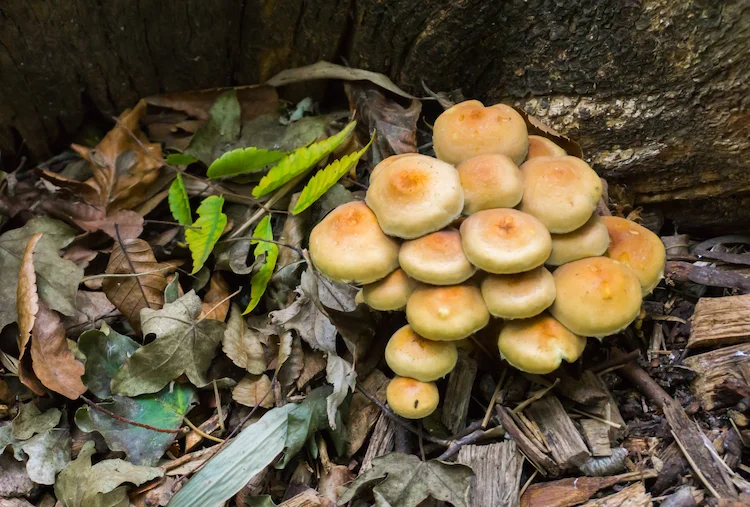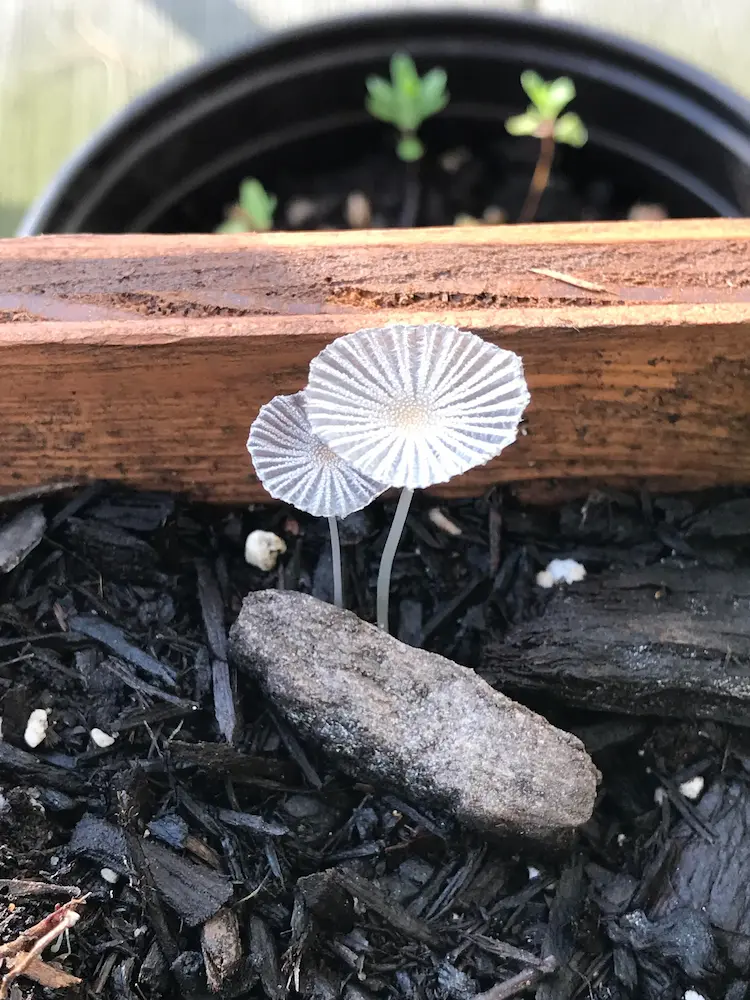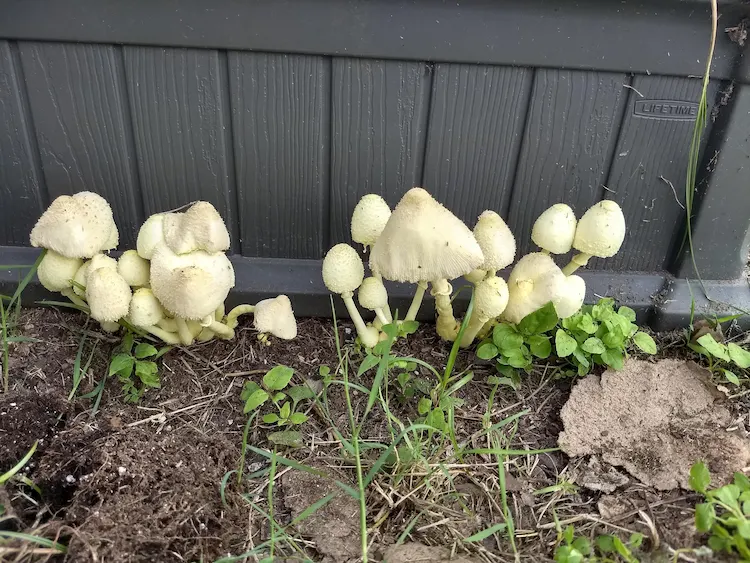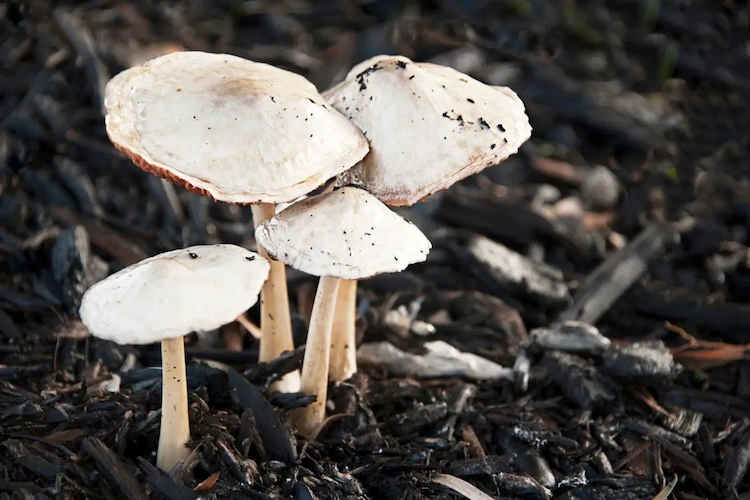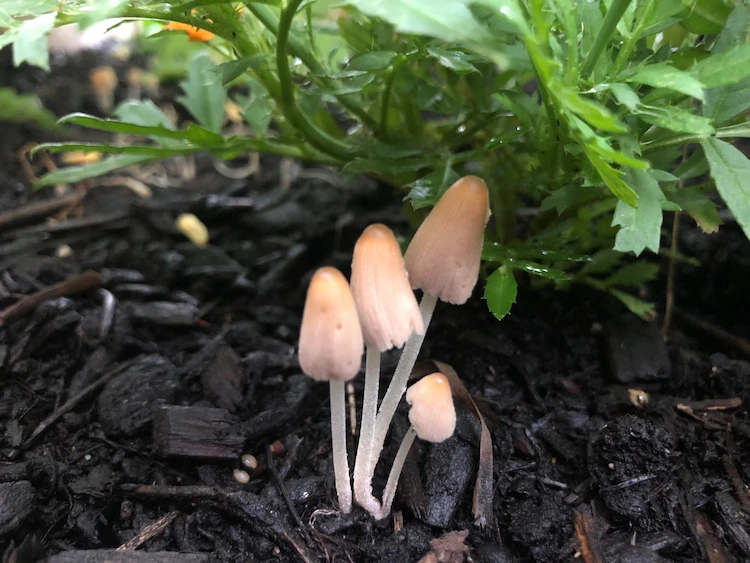Mushrooms often develop in your garden beds, as gardens create many favorable conditions for their growth. Why do I have mushrooms growing in raised beds? Are they problematic? Or do they bring Benefits to the garden? What can you do if you want to get rid of them? We answer all of these questions in this post!
Mushrooms spread by spores they by spores they release into the air, and they grow where the spores land. If mushrooms are growing in your garden bed, it’s probably because spores are already present in the soil. These spores form deep fungal networks called mycorrhizae, which encourage the growth of new plants by providing them with water and nutrients.
What Encourages Mushrooms Growth?
Raised beds create some conditions that are favorable for the growth of mushrooms. Mushrooms like high humidity and raised beds are usually moist enough so that not only plants thrive, but also mushrooms. Shady areas between the beds are also very suitable for mushrooms. These shaded areas provide a cooler and moister environment that is perfect for mushrooms. Warmer soil is also preferred by mushrooms and the organic matter is a perfect food source.
Raised beds with higher humidity and slower drainage are more susceptible to mushroom growth, and they can develop very quickly if the garden is not well tended in late summer and fall. Untreated wood used for raised beds also creates perfect conditions for mushrooms. If you have a slightly alkaline soil in the garden, for example, over fertilization with calcium, the growth of mushrooms is also encouraged.
If the soil is not compacted, this can be another reason why mushrooms grow in the raised bed. The lack of compaction creates a more favorable environment for the growth of mushrooms.
Mycelia are present in all compost and soil, so it is very likely that mushrooms can grow in your garden, even if you have never noticed it before. Because of the above conditions, raised beds are the ideal space for mushroom mycelia to thrive.
Are Mushrooms Growing in Raised Beds a Problem?
Are mushrooms growing in raised beds good or bad? Mushrooms in raised beds are not actually a problem and are not a reason for concern. It can be said that they even have some benefits for your plants. Do you know that mushrooms actively produce nutrients? They can generate their own nutrients and they don’t depend on plants for survival. Mushrooms can even help improve soil quality. They help decompose foliage, much like worms and mycelia form symbiotic relationships with deciduous trees and shrubs.
Because mushrooms help break down organic matter in the soil, plants can easily access important nutrients and moisture.
Most mushrooms are harmless, however, some species are poisonous to humans, but they are rare. If you don’t like the look of mushrooms or are afraid of certain poisonous varieties, you can easily remove them from your raised beds.
Note: Do not consume mushrooms from your garden beds without consulting a mushroom expert.
How to Get Rid of Unwanted Mushrooms Growing in Raised Beds?
What to do to get rid of mushrooms growing in raised beds? It’s very easy to get rid of them once you spot them. Remove them before they sporulate. It will take a few years for mushrooms to completely disappear from your raised beds. You must remove them regularly. Wear gardening gloves when doing so.
Are there home remedies for mushrooms in raised beds? Some gardeners recommend raising the acidity with liver of sulfur or vinegar to help the mushrooms go away, but raising the acidity enough to get rid of the mushrooms will also destroy the soil’s health. So the only good option is to pick the mushrooms by hand.
How to Prevent Mushrooms Outdoors?
So that you don’t have to fight mushrooms in raised beds when it’s too late, there are some measures you can take to prevent them from growing.
- The first and easiest way to prevent mushroom growth is to dry out the soil. In this way they will not be able to multiply.
- Provide good drainage. This is very important, as this is how you maintain proper humidity. So make sure the liner has holes to allow moisture to escape, and next year mix finer compost into the soil to improve drainage. Also make sure the bed is sloped to allow water to drain away.
- Use only well-rotted manure for your raised beds so you don’t encourage the growth of mycelia. If you add fresh manure to your compost pile, the mushrooms will spread and inevitably return in the fall.
- Increase air circulation by pruning any plants that block air flow.
- If you have the option of using raised beds made of stone instead of wood, this would also be a good way to prevent mushroom growth. Raised beds made of wood are notorious for fungal infestation, especially on the shady side of the bed. If you are using wooden raised beds, treat the wooden sides with a 50:50 mixture of vinegar and water.
- Encourage wildlife in your garden. Squirrels, hedgehogs, rabbits, deer and snails also love mushrooms. Hedgehogs in particular love these tasty snacks and tend to avoid the rest of your crops, so they are most suitable for removing mushrooms from your raised beds.

